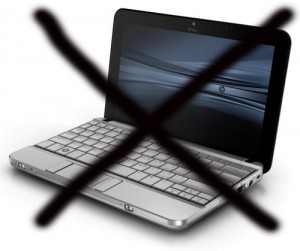 I could understand the purpose of a netbook but I couldn’t understand what its long-term value proposition was. It also seemed somewhat ludicrous that all of these PC manufacturers would compete with each other in a category where they have virtually no control over what specs go under the hood. The Intel Atom N270 processor must have been in the lion’s share of netbooks that hit store shelves in 2009, along with similar numbers in RAM, hard drive capacity and screen size. Sure, colours and some Linux-based OS dual-boot ideas created a little variation, but generally speaking, there was little difference between all of them.
I could understand the purpose of a netbook but I couldn’t understand what its long-term value proposition was. It also seemed somewhat ludicrous that all of these PC manufacturers would compete with each other in a category where they have virtually no control over what specs go under the hood. The Intel Atom N270 processor must have been in the lion’s share of netbooks that hit store shelves in 2009, along with similar numbers in RAM, hard drive capacity and screen size. Sure, colours and some Linux-based OS dual-boot ideas created a little variation, but generally speaking, there was little difference between all of them.
The netbook category in itself is a loser’s game, especially for the manufacturers. Margins must be razor-thin, given the cost of the components and the Windows license, alone — never mind production and shipping costs. Manufacturers were able to sustain that in the short-term during a recession, but with a recovery in the offing this year, the netbook will either simply become a niche for business users or it will become irrelevant altogether.
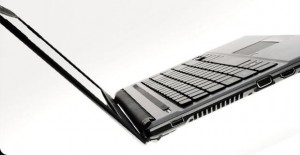 The key reason, however, is because a three-pronged assault on the netbook category is already well underway. Only a year ago, the form factor of a “thin and light” notebook would’ve likely come with a price tag of $1,800 or more. This was, after all, what thin notebooks like the MacBook Air, Dell Adamo, HP Voodoo Envy and Toshiba Portege were going for in retail. But suddenly, this changed in the summertime with new “ultraportable” and “thin-and-light” notebooks with 12” and 13” screens from several manufacturers at price points of $600-$800 — a considerable difference that made netbooks selling for $500+ look too expensive. Though the Adamo, Air, Envy, Portege and other similar models continued to be “elite” thin notebooks, portability and battery life had improved to a point where that kind of form factor didn’t have to be elite at all.
The key reason, however, is because a three-pronged assault on the netbook category is already well underway. Only a year ago, the form factor of a “thin and light” notebook would’ve likely come with a price tag of $1,800 or more. This was, after all, what thin notebooks like the MacBook Air, Dell Adamo, HP Voodoo Envy and Toshiba Portege were going for in retail. But suddenly, this changed in the summertime with new “ultraportable” and “thin-and-light” notebooks with 12” and 13” screens from several manufacturers at price points of $600-$800 — a considerable difference that made netbooks selling for $500+ look too expensive. Though the Adamo, Air, Envy, Portege and other similar models continued to be “elite” thin notebooks, portability and battery life had improved to a point where that kind of form factor didn’t have to be elite at all.
The launch of Windows 7 made it easier for manufacturers to offer leaner and more practical notebooks that could run on more powerful processors and video cards. With some netbooks getting to 11” screens, almost full-sized keyboards and heftier prices, their value proposition vis-à-vis these newer ultraportable and thin-and-light PCs made little sense. The netbook was never intended to be a primary computing device, something well understood by business users and road warriors, but seemingly lost in translation for consumers tight on cash.
Apple’s Tim Cook once suggested that the iPhone and iPod Touch are both devices that essentially performed like netbooks. They give consumers easy access to email and a Web browser, including the ability to download applications that enhance the usability of the devices, he said. His assessment was a bit of a stretch, but maybe that’s how all the Apple tablet rumours and hype started. If Apple could simply make a bigger iPod Touch with a hybrid OS X/iPhone OS mashup that offered the best of both worlds, then perhaps there would be no need to enter the netbook frenzy in the first place.
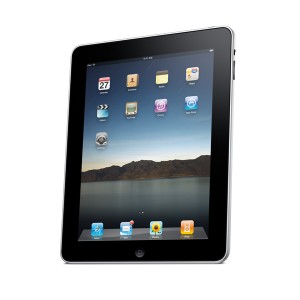 Apple did launch something akin to an oversized iPod Touch in the iPad, and Steve Jobs did make it clear that his company was looking to create a new category between a smartphone and a notebook. He didn’t explicitly say so at the launch, but his disdain for netbooks is already well-known. If the netbook was originally supposed to be that bridge from a smartphone to a notebook, then the iPad and the rest of the slate PCs coming this year will be sure to drive the netbook further towards obscurity.
Apple did launch something akin to an oversized iPod Touch in the iPad, and Steve Jobs did make it clear that his company was looking to create a new category between a smartphone and a notebook. He didn’t explicitly say so at the launch, but his disdain for netbooks is already well-known. If the netbook was originally supposed to be that bridge from a smartphone to a notebook, then the iPad and the rest of the slate PCs coming this year will be sure to drive the netbook further towards obscurity.
Despite the lukewarm reception to the iPad, it was unlikely that even Apple could measure up to the relentless hype driven toward the launch. Way back in 2001, the iPod launched quite some time before it really took off, and part of the reason is because digital music still needed to evolve around a leader that could perfect the business model of selling it digitally. Add the simplified process of iTunes as a software and storefront counterpart, and a lethal combination was born. It’s obvious that Apple is betting the iPad and iBookstore connection will be a powerful — and lucrative — tandem.
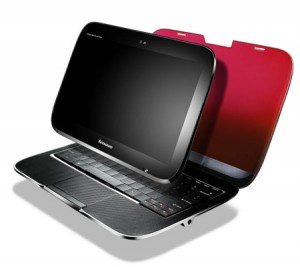 Slate PCs weren’t in abundance at CES, but they still loomed large. Lenovo made things interesting with a netbook/slate hybrid in the IdeaPad U1 — a netbook running Windows 7, but also a slate PC that could detach and run on its own with a Linux-based OS. It’s a fabulous product, though I wonder how palatable its US$999 price tag might be. The perfect storm for slates is there, given that Windows 7 offers multitouch, and the price of components has gone down enough to provide a more agreeable price to consumers. If slate PCs come in at ballpark $500 price points, like the entry-level iPad, then it’s entirely possible that netbooks will lose even more appeal, especially to consumers looking for a more casual and intuitive experience.
Slate PCs weren’t in abundance at CES, but they still loomed large. Lenovo made things interesting with a netbook/slate hybrid in the IdeaPad U1 — a netbook running Windows 7, but also a slate PC that could detach and run on its own with a Linux-based OS. It’s a fabulous product, though I wonder how palatable its US$999 price tag might be. The perfect storm for slates is there, given that Windows 7 offers multitouch, and the price of components has gone down enough to provide a more agreeable price to consumers. If slate PCs come in at ballpark $500 price points, like the entry-level iPad, then it’s entirely possible that netbooks will lose even more appeal, especially to consumers looking for a more casual and intuitive experience.
This is why touch devices that are easy to hold and navigate represent another death knell to the netbook. Slate PCs have a support system behind them based on a constant availability of new content. It’s a big reason why the iPod became what it is today, and the same formula carries potential for slates as well. While touchscreen netbooks were on display at CES, it was hard to see just how viable these could be. Why flip open a 10” screen and start touching (not to mention smudging) the screen when you have a keyboard and trackpad right there in front of you? You could argue that All-in-One desktop PCs have the same issue, but that’s not necessarily true if you consider that they offer far more interactivity on screens more than double the size.
Then comes the burgeoning power of smartphones. Cook’s interpretation of the iPhone as a device that offers much of what a netbook does was on the right track, even if it was an overstated bias. Netbooks could never compete with the digital Swiss Army knife value proposition smartphones provide. The key differences were in real estate — full-fledged keyboards and 10” screens. But take those elements away, and what do you truly have?
When asked about the iPhone’s unveiling, Microsoft CEO Steve Ballmer scoffed at the lack of a keyboard, positing that consumers likely wouldn’t take to the device. But consumers are more adaptable than perhaps he thought they were. The iPhone could never match the functionality of a keyboard on a BlackBerry or the plethora of other smartphones out there, but it did offer an intuitive interface and user-friendly experience never quite seen before.
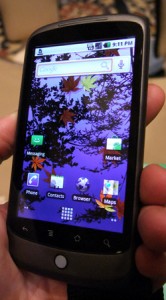 And with that began a smartphone arms race that is contributing to the demise of the netbook. With Google Android looming larger, Palm’s webOS still in the game and Nokia’s next OS coming at some point, the increased competition is sure to create interesting ideas. Netbooks can’t compete with that kind of innovation because the guts inside them don’t allow for much tinkering. And though Windows 7 runs well on many netbooks, the user experience is not considerably different than it would be on a notebook. It’s just smaller and more portable, but negligibly so compared to a notebook that is only a little bit bigger, and a little more expensive.
And with that began a smartphone arms race that is contributing to the demise of the netbook. With Google Android looming larger, Palm’s webOS still in the game and Nokia’s next OS coming at some point, the increased competition is sure to create interesting ideas. Netbooks can’t compete with that kind of innovation because the guts inside them don’t allow for much tinkering. And though Windows 7 runs well on many netbooks, the user experience is not considerably different than it would be on a notebook. It’s just smaller and more portable, but negligibly so compared to a notebook that is only a little bit bigger, and a little more expensive.
Simply put, the netbook is under attack from three directions: increasingly cheaper ultraportable and thin-and-light notebooks, tablets and slate PCs and smartphones. It used to be that business user trends impacted consumer trends, but that has pretty much reversed over the last couple of years. As consumers continue to reject netbooks over the course of this year, business users might still feel the need to use them as secondary machines, but they too might eventually wean themselves off them — especially if they can find something more powerful and dependable for only a little more money.
It will be an interesting year for computing, in general, but don’t be surprised if a tombstone slowly emerges around the netbook category.




I think Ted’s really hitting on some good points. To be honest, I thought netbooks were ridiculous until I got one as a gift. And now I carry my little twerp everywhere, even though I do have a Portege M700 tablet with touch screen, which is pretty portable too.
While Ted’s points are clear and well founded, I’d tend to look at this more as evolution than death. What was really important with the netbook was the innovation. It was the right direction to go at the time, and it drove technology a long way. And while we may not call them netbooks, the future of portable/cloud computing will continue to thrust forward, due very much in part to the progress driven by the netbook market.
The market has been rounded up. Now, where will it be taken? Clearly, netbooks need to transform in order to remain relevant in the world of computing technology. I tend to think they’ll transform rather than die off, but that may be a flimsy statement.
Ted –
In my humble opinion, I think you hit the nail on the proverbial head here, with respect to netbooks. They were – are – a fabulous PC for the recession. They are a great solution as a second PC. Being able to slip a small, thin, light PC into a purse (even a man-purse) is very convenient. But they aren’t a ‘full-time’ PC, nor should they be.
I’m not 100% convinced that the iPad will change the world – not in the next year, anyway. But I do know that the pricing model of netbooks is unsustainable for vendors. Highlighting the product pricing, capabilities and limitations provided an excellent and valuable overall picture of the 2010 netbook market.
Juxtaposing the product with smartphones, touchscreen slate tablets and ‘regular’ notebooks provides an accurate picture of the overall challenges facing the netbook market.
Looking forward to reading more of your commentary,
Michelle
Ted makes a lot of good points as to why the netbook seems, well, DOA.
A choice of colours is not really enough to make one product stand out against another, as he says.
And, even when you get a certain ‘slate book’ appeal going, prices around $1000 can stop you in your tracks.
Touch screens are so user friendly and expected these days; it doesn’t make much sense to get a device without one (or one with a too small screen in the first place).
But…
We’ve caught wind of a new device that maybe addresses all these shortcomings, while adding in some cool new options at the same time.
Of course, we plan full to do a full hands-on review, but for now, we have a teaser story on the new X200 Netbook from PDC .